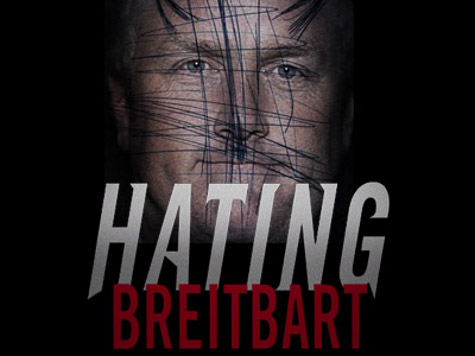
Friday night the documentary Hating Breitbart opened in limited theatrical release and via Video On Demand services. It also became available for download at Rotten Tomatoes and iTunes.
Written and directed by Andrew Marcus, Hating Breitbart follows the late, great conservative media icon Andrew Breitbart’s life during the rise of the Tea Party movement. Much of the film is dedicated to the ACORN scandal and chronicles the fine work of then 25-year old James O’Keefe and 20-year-old Hannah Giles. The duo posed as a pimp and a prostitute trying to buy a house with government money so they could have a place for underage Guatemalan girls to turn tricks–in exposing the corruption at several ACORN offices around the United States.
The ACORN story illustrates how Andrew Breitbart’s genius wasn’t always in finding the story, but how he presented a story that someone else brought him. In the case of ACORN it was releasing O’Keefe’s videos one at a time that made the story gain traction despite the traditional media’s attempt to ignore it.
This strategy gave Bertha Lewis, the CEO of ACORN, the opportunity to dig her organization’s own grave by claiming that O’Keefe and Giles had deceptively edited their videos and that they had been thrown out of other ACORN offices. The following day Andrew Breitbart would release another video of the same sting in the city where the two citizen journalists had allegedly been “thrown out” according to Lewis.
The documentary also spends a significant amount of time on two incidents that supposedly occurred on the steps of the U.S. Capitol, the day of the Obamacare vote. Representative Emanuel Cleaver, a Missouri Democrat, alleged that a Tea Party protestor had spit on him as he walked from his office to the Capitol building. On the same day, Georgia Democratic Congressman John Lewis also alleged that he had the “N-word” hurled at him up to 15 times as he too walked from his office to the Capitol.
Team Breitbart gathered video from multiple sources and angles attempting to disprove (or prove) that either incident had happened. As Andrew Breitbart put it, the incident happened in “a sea of new media.” If the incident had happened surely someone would have caught it on camera. Breitbart.com reporters also spoke with Capitol Police who said they didn’t see the spitting nor heard any racial epithets being hurled at any of the members of the Congressional Black Caucus.
Andrew Breitbart was so certain that the incidents hadn’t occurred and so incensed that these two congressman were besmirching innocent Tea Partiers that he offered $100,000 for video of just one Tea Partier saying the “N-word.”
To date no one has claimed the money.
But as the movie shows, traditional media reporters were only too happy to take the congressmen at their words, and attacked both the Tea Party and Andrew Breitbart as “racists” without a shred of evidence. For the media, the testimony of two icons of the civil rights movement was all the “evidence” they required. In addition to ACORN and Obamacare, the movie chronicles the Shirley Sherrod story and, of course, “Weinergate” near the closing credits.
The filmmakers had exclusive, behind-the-scenes access to Andrew Breitbart during the tumultuous rise of the Tea Party. They followed him from rally-to-rally and from speaking events to photo shoots and caught the real and unscripted media mogul, right down to him ironing his own pants and brushing his teeth.
There’s one Andrew Breitbart quote in the movie that really encapsulates who he was– “I only have two speeds, jocularity and righteous indignation.”
And the filmmakers capture him in both modes. You see him joking around with his good friend Stephen K. Bannon and you also see him taking on his enemies, the liberal “mainstream media” as they falsely accuse him of being a racist, having a coke habit and even of having homosexual extramarital affairs.
As Andrew Breitbart himself famously put it, “They declared war on me.”
On a scale of 1 to 5 stars, I’d give Hating Breitbart 4.5 stars. The only fault I found in this documentary was the pacing. It does drag a little in some spots, but other than that, it’s a true representation of the man that changed the way that news is reported and more importantly who reports it.
Andrew Breitbart inspired an army of citizen journalists to pick up their Flip cameras and cellphones to capture the news as they see it. He also inspired them to write about all the stories and issues that traditional “journalists” refuse to report on and to become a new media–a citizen media–via the Internet, in podcasts, blogs and social media, to take on the left.
I proudly count myself among that army. I had the genuine pleasure of meeting him twice and interviewing him on my Internet radio show.
After watching Hating Breitbart I was left thinking how much I miss Andrew Breitbart. I was also reminded of a quote I was lucky enough to get from him when he was on the show in May of 2011.
“I like being liked, who doesn’t? But I love being hated.”
That in a nutshell is what Andrew Breitbart was all about and what this documentary captured. He may be gone, but his army of citizen journalists marches on. Whether you loved, hated or never heard of him, you should see this movie.

COMMENTS
Please let us know if you're having issues with commenting.